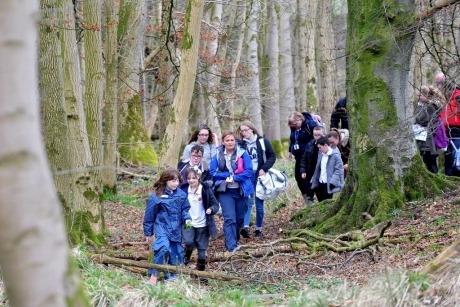STO talks to Willie White, education officer for East Ayrshire Council (EAC) to find out why learning outside of the classroom is so important.

Q. Tell us aboutthe council’s education department, and what it strives to do.
A. East Ayrshire is a diverse area covering some 490 square miles of South West Scotland with a population of 122,440, spread over both urban and rural communities, of which 24,281 are aged 0-17. We know from Scottish Indices of Multiple Deprivation that East Ayrshire has consistently been one of the most deprived areas,relative to Scotland as a whole. We have a varied natural environment, a rich and diverse cultural heritage and a proud industrial history.
EAC is one of the 32 Scottish Local Authorities which provides public services, such as education for geographical areas. The education department manages the 54 schools in the region.
EAC strives to make East Ayrshire a place with strong, safe and vibrant communities where everyone has a good quality of life and access to opportunities, choices and high quality services which are sustainable, accessible and meet people’s needs.
Q. What do you offer in terms of learning outside the classroom?
A. EAC has a vision that all children and young people in East Ayrshire, at ages 3-18, across all subject areas and beyond, should get regular opportunities to learn outdoors.
In addition to learning in the school grounds, EAC education establishments provide approximately 10,000 out of school visits per year having risen from 7,000 in 2011.
EAC leads this vision through the Learning Outdoors Support Team (LOST). LOST, as well as meeting as a professional learning network throughout the year with varied training opportunities, also runs a sixmonth led outdoor teacher/practitioner programme covering EAC policy, method and safety procedures. They provide specific H&S, insurance and safety training for all newly qualified teachers and others as required. They advise on funding application support and coordinate specific programs across the authority, such as the Duke of Edinburgh Award.
Q. What age range are your experiences suitable for and what subject links do they have?
A. Outdoor learning and other out of school visits are suitable for children and young people aged 2-18. However they are also very suitable for our adult teachers and staff providing much needed fresh air, physical activity and opportunities to challenge practice and inspire creativity.
We aspire to avoid the idea of “links” to subjects, preferring to teach all subjects that are relevant in the real world beyond school and beyond the classroom. As such, we hope to contextualise the relevance of the indoor classroom teaching in young peoples’ lives and communities.
Q. Tell us about some of the activities on offer to pupils?
A. We encourage staff to invent activities. For example understanding angles; a class could be challenged to build tarpaulin dens using three acute, two right and one obtuse angles. Practising vocabulary; reading The Owl Who Was Afraid of the Dark, in the dark with torches pulling apart owl pellets. My world; archaeological dig on the grassy mound in the farmer’s field beside school.
Q. Please explain a bit about why you think residential trip are important to learning.
A. They can be highly worthwhile and impact ways of teaching and learning.
We are also convinced by the Learning Away Brilliant Residentials impact study - that inclusive and affordable residential trips that are high-quality, led by teachers, fully integrated into the curriculum, and planned so that learning is embedded and reinforced back in school -can provide extremely powerful learning opportunities for young people of all ages and abilities, as well as having an impact on teachers and schools as a whole.
Alan Ward, head of Education at East Ayrshire Council, said: “When you break down the barriers of the school timetable and the school walls and take learning on an overnight visit somewhere new you see children flourish in different ways.
Q. How do your programmes tie in with the National Curriculum?
A. Scottish schools follow the Scottish Curriculum for Excellence (CfE) instead. Education Scotland (our OFSTED) identified that many aspects of CfE subjects, at all levels, could be taught outside. We start with the curriculum and the available outdoor environment and design suitable method, activities, resources, assessments and programmes.
Q. What makes the council’s educational experience stand out from other bodies that might provide a similar offering to schools?
A. We work in partnership with a huge range of valued third sector and commercial organisations with specific expertise who provide offerings to our schools. However EAC teachers and schools remain the experts of each child’s learning needs. What we do differently, is expect that all our young people should access the benefits of this amazing value, high impact practice. .
For more information call 01563 551457 or visit: www.learningaway.org.uk/residentials/guiding-principles/ and www.east-ayrshire.gov.uk/EducationAndLearning/EducationAndLearning.aspx.










